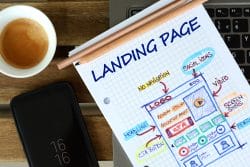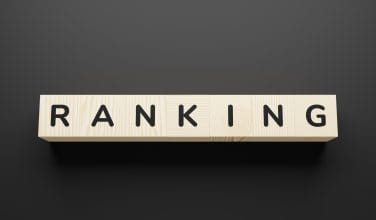Definition of a Landing Page
This article was published on May 9, 2011
Categorized in: Glossary
A landing page, also known as a destination page, static page, or lead capture page, is the web page that users arrive at when they have clicked on a link in a search engine results page. A landing page can also be arrived at by clicking on a marketing promotion, email promotion, or online ad. A landing page usually displays sales copy that is an extension of the search result or advertisement.
users arrive at when they have clicked on a link in a search engine results page. A landing page can also be arrived at by clicking on a marketing promotion, email promotion, or online ad. A landing page usually displays sales copy that is an extension of the search result or advertisement.
What is the goal of a landing page? The goal of a landing page is to create leads or sales. If the goal of the website is to gain more leads, contact information will be asked for. It could be basic information such as name and email address or more in depth by asking for a phone number so they can get in touch. If sales are the goal of the website, there will be a shopping cart or checkout area for the visitor to click on. For marketers, analyzing the activity that is generated by the linked URL will help them determine the success of an ad through the conversion rates and click-through rates.
There are two types of landing pages:
• Transactional landing pages: transactional landing pages attempt to persuade a visitor to complete a transaction on the website. This is done by filling out a form where the visitor gives their email address and other information. This information will be used to develop an email campaign. The goal of a transactional landing page is to gather as much information about the visitor as they can. This is done with the hopes that the visitor will become a customer.
• Reference Landing Page: reference landing pages present relevant information to their visitors. This type of landing page may include images, text, and other things that will keep the visitor interested and on the landing page. The reference landing page should lead the visitor to the transactional landing page type.
Why are landing pages needed? Landing pages are a great way to promote the action that you would like your visitor to take whether it be signing up for a newsletter or purchasing the product you are selling. Having a landing page can boost your website’s performance. Search engines can determine how well your site is doing by how well you anticipate your visitor’s needs. Landing pages with relevant keywords can help boost your search engine optimization (SEO) ranking.
What should a good landing page include? A successful landing page must contain content that is clear and concise. You want to explain what you have to offer in a way that makes the customer not only want to know more, but to buy. It’s a good idea to remove the navigation menu and other links as to not distract the customer and take them away from the landing page. Your landing page may also contain images, short videos, and animations as well as a sign up form. Depending on your offer, you may only request an email address. If the offer is more high value, you may ask for more information.
Definition of Landing Page Sources:
LIKE AND SHARE THIS ARTICLE:
About the Author: Brick Marketing President, Nick Stamoulis
 Nick Stamoulis is President of Brick Marketing and has over 25 years of digital marketing experience. He works directly with clients on strategy and implementation, helping solve complex challenges through SEO, AI Search Optimization (GEO), content marketing, social media, PPC, and conversion improvement. Nick Stamoulis has worked with over 500 companies across virtually every B2B industry and also provides digital marketing consulting and training classes, helping companies improve performance and achieve desired digital marketing outcomes.
Nick Stamoulis is President of Brick Marketing and has over 25 years of digital marketing experience. He works directly with clients on strategy and implementation, helping solve complex challenges through SEO, AI Search Optimization (GEO), content marketing, social media, PPC, and conversion improvement. Nick Stamoulis has worked with over 500 companies across virtually every B2B industry and also provides digital marketing consulting and training classes, helping companies improve performance and achieve desired digital marketing outcomes.




